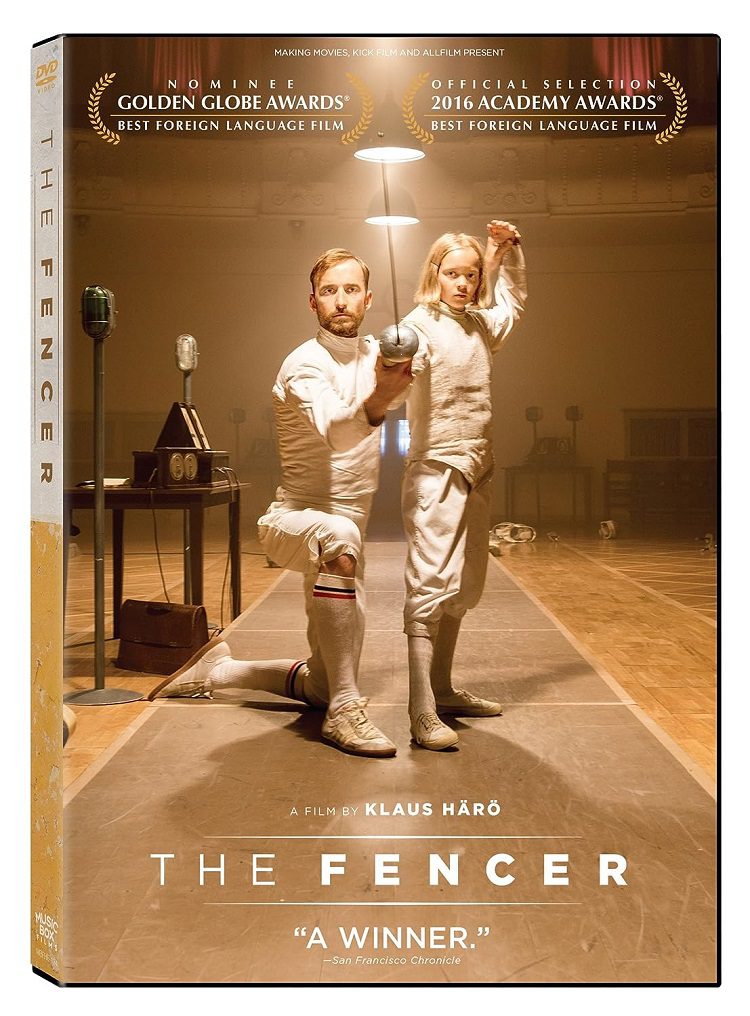
Never before have I seen a sports movie whose main emotional tone was quiet dread. One look at the title: The Fencer, and you know the film is about fencing, and when you hear the basic storyline – in 1953, a man moves from the big city and begins a fencing school in a small town – many of the story beats will already be known to a savvy viewer. Yes, he’s reluctant to teach at first but darn it if the moppets don’t get into his heart. There’s a love story with a demure teacher. There’s a big tournament at the end, too.
But the fencer of the title, Endel Nellis, doesn’t want his team to go to the tournament, held in Leningrad, because he’s afraid he’ll finally be caught by the Soviet Secret Police. He’s in the small Estonian town of Haapsalu in order to lay low, for the crime of his country having been conquered by the wrong group of totalitarian monsters at the wrong time, being pressed into service by the Germans near the end of the war.
We first see Endel in a shot that becomes kind of a signature of his character – the camera follows closely behind his head, with his high collar covering his neck, making him look as anonymous as possible. When he interviews with the school principal where he will be teaching, a tone of resentment and distrust running through the principal’s questions: why would anyone leave Leningrad for here? Distrust is the common thread through most adult interactions in the film. Every time there’s a knock on the door it could be men coming to take you away for some unspecified crime against the state.
When Endel first comes to town, he doesn’t want to raise any kind of fuss, or make any connection. He’s cold and distant with the children, but it doesn’t seem to suit his nature. He tries to start a ski club, but the Soviet Army comes and takes the school’s skis at the first snow. So he starts a fencing club. There’s no equipment, so the kids find appropriately long sticks and craft make-shift foils to practice with.
The club becomes popular, a distraction from the gray and dreary hopelessness of life in this small Soviet-controlled town. This popularity further fuels the principal’s resentment, and when he can’t get the townspeople to vote to get rid of the club, he sends a minion to research all the can about Endel, so the principal can get rid of him.
The club, of course, is chock full of adorable little children. The two highlights are the moody Jaan, and the tiny but determined Marta. Jaan’s grandfather was a fencer, and he provides a second foil and protective gear so the training can really take off. Marta is the first student to be interested in fencing, and she has a real enthusiasm for jamming a sword at people. Both of them are missing their fathers, taken away by the police for no reason the children will ever know.
The Fencer was directed by Finnish filmmaker Klaus Haro, who seems to be making a career out of period pieces set in post-war northern and Eastern Europe. With this film, based partially on the real life of Estonian fencing instructor Endel Nellis, he walks a number of fine lines tonally that could have turned it into a mess. Scenes about Endel’s paranoia could have become too much like a thriller. The kids could be too cute or too sad and make the movie maudlin, or the dark mood of the picture could have been too depressing. Instead, he finds a balance to the elements – it never overheats into melodrama nor pushes too far into sports cliché. There is no evil team that the kids have to beat, but rather real world stakes: fulfilling the kids’ dreams of really competing in fencing might just bring enough attention to Endel to get him arrested.
The Fencer, which was Finland’s Academy selection for Best Foreign Language film in 2016 and which opens this Friday (7/21) in New York, corrects two gaps in world cinema at once: there are very few movies about fencing (as opposed to movies which contain fencing) and there are far too few about life in the Soviet police state, where merely getting on a bureaucrat’s bad side can get you investigated and thrown into a prison camp, or worse. In combining these themes, The Fencer elevates the sports movie formula, by showing the value of sports beyond winning and losing. In a world where they have no power and no control, fencing gives these kids something to call their own. Some little form of hope.